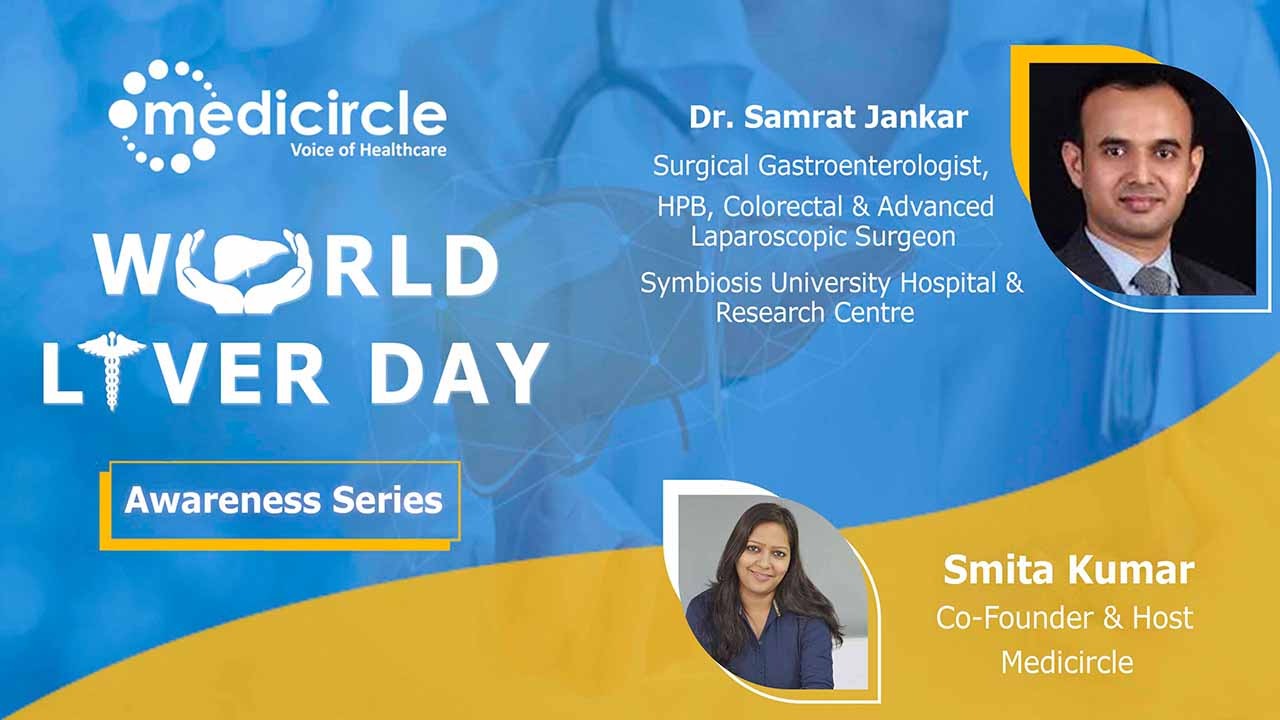The liver is the largest organ in the human body. It performs over 500 functions including digestion of proteins, minerals, storage by production, and plant filtration. Over the past decade, there has been a steady rise in the number of cases of liver diseases even in young generations. The causes are mostly not a good lifestyle, not doing exercising or not following a proper diet. On this World Liver Day, we at Medicircle presents you World Liver Day Awareness Series wherein we are speaking to some very eminent Gastroenterologists and Hepatologists to build awareness about the healthy functioning of the liver.
Dr. Samrat Jankar is a Surgical Gastroenterologist HPB Colorectal and Advanced Laparoscopic Surgeon. He's currently associated with Symbiosis University Hospital and Research Centre, Pune as a Consultant Surgical Gastroenterologist. He had earlier work with eminent healthcare organizations like GEM Hospital and Research Centre and Government Medical College, Latur.
The liver is important for detoxification, absorption, and digestion
Dr. Samrat speaks, “Liver is the most important organ of our body which we usually neglect. The liver is a kind of factory where all the food which we eat gets processed (carbohydrates, proteins, fats) and as per the requirement of the body, absorption of food is done. Carbohydrates are stored in the liver in form of glycogen. Liver detoxifies the harmful chemicals and removes them from the body. Hence, liver is most important for absorption, digestion, and detoxification.”
The liver is highly adjustable
Dr. Samrat expresses, “Liver is a highly adjustable organ. Just to satisfy our taste buds, we consume a variety of fast and processed foods which is actually not good for our health. As it is highly adjustable, it doesn’t show any signs or side effects of eating junk food. To keep our liver healthy, a healthy diet and an active lifestyle are necessary. Along with this, one should stop craving unhealthy junk food.”
Tips and advice for healthy liver
Dr. Samrat suggests, “Indian traditional food is the best food to keep our liver healthy. Adequate use of garlic, turmeric in food helps in boosting the detoxification process as they contain antioxidants and keeps the liver healthy.
Citrus fruits such as lemon and oranges which contain vitamin C also helps in the detoxification process and keep our liver healthy.
Fruits and green leafy vegetables are also useful. Green leafy vegetables contain flavonoids which are of utmost importance. Carrots, apples, beetroot, ginger which are being used in our kitchen are very much good for our health.
Amongst Non-Veg, fish is very helpful in keeping our liver healthy as it contains omega fatty acids.
Along with healthy food, daily exercise is a must to keep us healthy.”
Moderate consumption of alcohol is good for health - Myth
Dr. Samrat says, “Alcohol is used to give a sense of comfort or elite. Moderate consumption of alcohol keeps you healthy is a myth. It is a false notion. Moreover, it is more important to know the weight of a person, the quantity of alcohol taken at a time, any associated liver disease.”
Alcohol is deadly for Liver
Dr. Samrat elaborates, “Alcohol is harmful to the body. The liver detoxifies 95% of alcohol that is being consumed and the rest 5% goes to the body. Frequent consumption of alcohol could result in the accumulation of alcohol in the liver. Thereby hindering the process of fats and toxin degradation. This gives rise to fatty liver disease. Although it shows normal symptoms like tiredness, fatigue, heaviness in the lower abdomen yet it is not good for us. 40% of Indians have fatty liver disease knowingly or unknowingly. At this stage, if a person stops taking alcohol, the damaged liver can regenerate on its own. But if a person doesn’t stop even now, inflammation and infection take place which is considered alcoholic hepatitis. This shows symptoms like mild fever, pain (acidity Kind of), tiredness, fatigue. If an individual stops here at this stage, the liver takes 1-2 years to regenerate but after this stage consumption of alcohol can lead to Cirrhosis wherein the liver starts getting scars as and when alcohol is consumed. This stage is not reversible. Consuming a drop of alcohol can results in Jaundice, blood clots in vomiting, inflammation in the legs. Further results in cancer or liver failure. Alcohol is deadly for the liver. One has to stay away from alcohol to keep our liver healthy,” adds Dr. Samrat.
Liver showing symptoms signifies that liver is not in the recoverable stage
Dr. Samrat informs, “Early stages of liver disease don’t show any symptoms. The stage at which liver starts showing symptoms signifies that liver is not in the recoverable stage. Intermittent stages of liver diseases like fatty liver disease, alcoholic hepatitis show some symptoms of tiredness, fatigue, heaviness in the lower abdomen. After this stage, you cannot afford to have a single drop of alcohol, as this is the final stage of liver disease characterized by jaundice, liver failure. Treatment at this stage gets very difficult.”
Dr. Samrat tells, “Alcohol and unhealthy lifestyle is the prime culprits and one should avoid all these for a healthy liver. The liver can be a silent killer. So regular check-up is also important for testing the functionality of the liver.”
(Edited by - Renu Gupta)

 “Liver is a highly adjustable organ. The liver is important for detoxification, absorption, and digestion of the body. A healthy diet and an active lifestyle are important for a healthy liver. Love your liver, you will live longer†informs Dr. Samrat Jankar, Consultant Surgical Gastroenterologist
“Liver is a highly adjustable organ. The liver is important for detoxification, absorption, and digestion of the body. A healthy diet and an active lifestyle are important for a healthy liver. Love your liver, you will live longer†informs Dr. Samrat Jankar, Consultant Surgical Gastroenterologist




.jpeg)
.jpeg)

_(1).jpeg)

.jpeg)


.jpeg)
_(1)_(1)_(1).jpeg)





.jpeg)

.jpeg)

.jpeg)
.jpeg)
.jpeg)
.jpeg)



